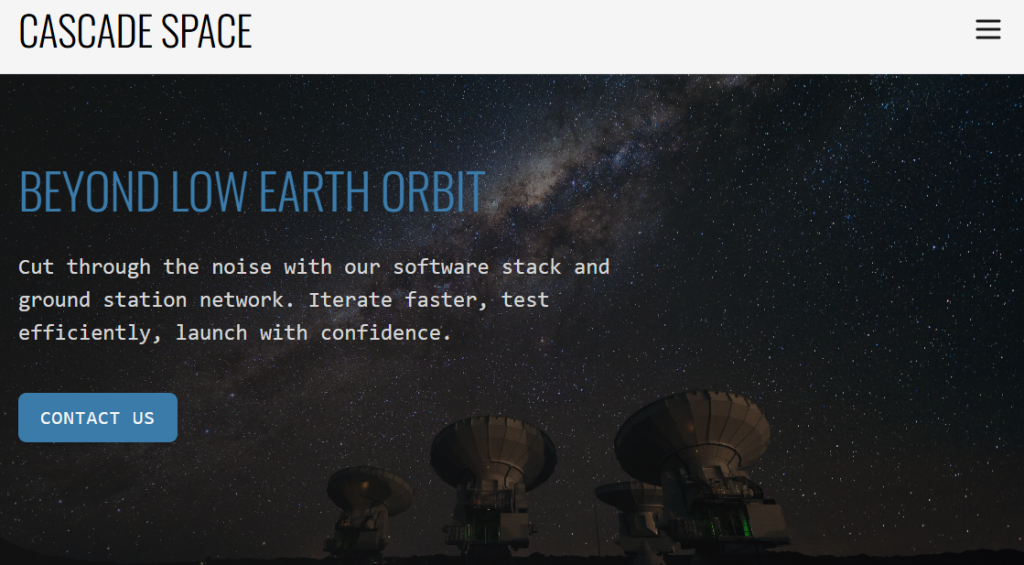Cascade Space Raises $5.9M to Pioneer Orbital Logistics Infrastructure
August 12, 2025
byFenoms Start-Ups

Cascade Space, the orbital infrastructure startup founded by Jacob Portukalian, just raised $5.9 million in seed funding to take on one of space tech’s most urgent but underserved problems: sustainable logistics in orbit. The round brought in an impressive lineup of backers including Nova Threshold, Undeterred Capital, Y Combinator, Night Capital, Olive Capital, Valkyrie Ventures, Karman Ventures, Palm Drive Capital, Garage Capital, TRAC, Aurelia Foundry, Hawktail, MGV.VC, Pioneer Fund, Liquid 2 Ventures, and several others.
At a time when satellite constellations are growing exponentially and launch costs continue to plummet, Cascade is going after the next great bottleneck: in-space maneuvering, refueling, and payload delivery.
Building the Logistics Stack for Orbit
What roads, ports, and highways were to industrialization on Earth, orbital logistics will be for the space economy. Cascade Space is aiming to become the FedEx of low Earth orbit (LEO) and beyond.
Their flagship product? A line of versatile space tugs capable of servicing, repositioning, or deorbiting satellites and other spacecraft with pinpoint precision. These vehicles will be modular, fuel-agnostic, and capable of being reprogrammed mid-mission to adapt to shifting requirements in orbit.
The first major deployment will focus on solving immediate commercial pain points: satellite deployment drift, costly re-orbits, and end-of-life management. Cascade aims to offer a full-service solution that enhances satellite lifetime value, reduces space debris, and improves fleet responsiveness for mega-constellation operators.
From Launch to Lifecycle: New Revenue Paths in Orbit
Here’s where it gets interesting for founders in space and aerospace: the real business opportunity isn’t just in building new spacecraft, it’s in enabling new business models across orbital operations.
Cascade’s approach opens the door for:
- Subscription-based orbital servicing (pay-per-reposition, refuel-as-a-service)
- Insurance-integrated mission support, reducing risk profiles
- Green orbital policies, by deorbiting defunct satellites to mitigate space junk liability
It’s this convergence of tech enablement and economic logic that creates a wedge for startups like Cascade to not just participate in the orbital economy, but to define the operating framework around it.
And for early-stage space founders? Cascade's execution underscores a critical insight: the money in space isn’t just where the rockets go, it’s in where the payloads live.
Strategic Investors Bet on Deployment, Not Just Discovery
The cap table reflects deep conviction from some of the boldest names in early-stage venture and aerospace:
- Y Combinator, continuing its thesis on critical infrastructure bets
- Nova Threshold, with strong experience backing hardtech moonshots
- Karman Ventures and Night Capital, focused on space and deeptech
The broad syndicate offers Cascade not just funding but deployment channels into government, defense, and commercial spaceflight ecosystems. From upstream launch platforms to downstream analytics, everyone in the ecosystem has a stake in more responsive, modular orbital logistics.
Founding Team with Hardware DNA
Jacob Portukalian, founder and CEO, comes from a background in aerospace hardware and systems integration. Prior to launching Cascade, he spent years building high-precision control systems at both startups and defense contractors. The founding team includes mechanical engineers, propulsion experts, and orbital systems designers who have worked across NASA, SpaceX, and the U.S. Department of Defense.
Their edge? Speed. Not just in propulsion, but in design iteration cycles, customer discovery with satellite operators, and real-world validation through early suborbital test campaigns.
The Orbital Infrastructure Boom
While launch tech has hogged the spotlight over the last decade (thanks to players like SpaceX and Rocket Lab), the next phase of the space race is playing out above the clouds.
The orbital infrastructure market is projected to surpass $35 billion by 2032, fueled by demand for broadband megaconstellations, in-space manufacturing, and real-time earth observation. According to Northern Sky Research, in-space servicing and logistics alone could account for $14 billion by 2030, up from under $1 billion today.
And we’re just scratching the surface.
With geopolitical tensions pushing nations to secure sovereign space capabilities and commercial players seeking differentiated capabilities in orbit, the need for agile, autonomous orbital services has never been greater.
Countries like the U.S., China, and the EU are also pushing for stricter orbital debris regulations, which means any player who can offer sustainable repositioning or deorbiting solutions has a strong first-mover advantage.
What’s Next for Cascade
Following the seed raise, Cascade Space plans to:
- Finalize design and prototyping of its first generation space tug
- Initiate its orbital demo mission within the next 18 months
- Scale its partnerships with satellite operators for mission trials
- Expand hiring across avionics, thermal systems, propulsion, and GNC (guidance, navigation, control)
The startup is also doubling down on its proprietary mission planning software, which it believes will become a platform in its own right - helping operators simulate, price, and schedule orbital logistics missions before committing to hardware launches.
Cascade Space isn’t just another aerospace startup chasing launches. It’s a logistics company rethinking what comes after the launchpad. With a well-funded war chest and growing buy-in from the aerospace community, it could very well be the company that writes the next chapter of in-space mobility.
The future of orbit is being built. And Cascade is helping it move.









